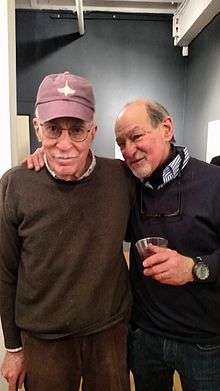Roger Angell
| Roger Angell | |
|---|---|
| Born |
September 19, 1920 New York City, New York, United States |
| Occupation | Author |
| Nationality | American |
| Alma mater | Harvard University |
| Genre | Sports journalism |
| Notable awards |
PEN/ESPN Lifetime Achievement Award for Literary Sports Writing (2011) J. G. Taylor Spink Award (2014) |
| Spouse | Evelyn Baker (deceased);[1] Carol Rogge Angell (deceased) |
| Children | Callie, Alice, and John Henry[2] |
| Relatives | E. B. White (stepfather) |

Roger Angell (born September 19, 1920) is an American essayist known for his writing on sports, especially baseball. He has been a regular contributor to The New Yorker and was its chief fiction editor for many years.[3] He has written numerous works of fiction, non-fiction, and criticism, and for many years wrote an annual Christmas poem for The New Yorker.[3]
He received a number of awards for his writing, including the George Polk Award for Commentary in 1980,[4] the Kenyon Review Award for Literary Achievement in 2005 along with Umberto Eco,[5] and the inaugural PEN/ESPN Lifetime Achievement Award for Literary Sports Writing in 2011.
He was elected a Fellow of the American Academy of Arts and Sciences in 2007[6] and is a long-time ex-officio member of the council of the Authors Guild.[4]
He was named the 2014 recipient of the J. G. Taylor Spink Award by the Baseball Writers' Association of America on December 10, 2013.
Early life and education
Angell is the son of Katharine Sergeant Angell White, The New Yorker’s first fiction editor, and the stepson of renowned essayist E. B. White, but was raised for the most part by his father, Ernest Angell, an attorney who became head of the American Civil Liberties Union.[7][8][9]
Angell is a 1938 graduate of the Pomfret School and attended Harvard University.[10] He served in the United States Army Air Forces during World War II.
Career
Angell's earliest published works were pieces of short fiction and personal narratives. Several of these pieces were collected in The Stone Arbor and Other Stories (1960) and A Day in the Life of Roger Angell (1970).
He first contributed to The New Yorker in March, 1944.
He first wrote professionally about baseball in 1962, when William Shawn, editor of The New Yorker, had him travel to Florida to write about spring training.[3][9]
Angell has been called the "Poet Laureate of baseball" but dislikes the term.[3][9] In a review of Once More Around the Park for the Journal of Sport History, Richard C. Crepeau wrote that "Gone for Good", Angell's essay on the career of Steve Blass, "may be the best piece that anyone has ever written on baseball or any other sport".[11] Angell was one of several personalities who gave commentaries throughout the Ken Burns series, Baseball, in 1994.
One of the most striking items from Angell's essays is one ultimately published in Season Ticket, involving a spring training trip to see the Baltimore Orioles, where he interviews Earl Weaver, then the manager of the Orioles, about Cal Ripken, Jr., who was about to start his rookie season. Angell quotes Weaver as saying about Ripken that, at whichever position the team decides (between shortstop and third base), "his manager can just write his name into the lineup every day for the next fifteen years; that's how good he is". Starting that year, Ripken in fact was written into lineups every day for more than fifteen years, setting the all-time consecutive-games-played streak of 2,632 games. Angell's quotation of Weaver stands as one of the most incredibly prescient (and well-documented) "first-guesses" in recorded literature.
Personal life
Angell has two children, Alice and John Henry. He had Alice and another daughter, Callie, with his first wife Evelyn,[1] and John Henry with Carol. Callie Angell, who was an authority on the films of Andy Warhol, committed suicide on May 5, 2010, in Manhattan, where she worked as a curator at the Whitney Museum of American Art; she was 62. In a 2014 essay, Angell mentioned her death -- "the oceanic force and mystery of that event"—and his struggle to comprehend that "a beautiful daughter of mine, my oldest child, had ended her life."[12] Alice Angell lives in Portland, Maine, and John Henry Angell lives in Portland, Oregon.[2]
His second wife, Carol Rogge Angell, to whom he was married for 48 years, died on April 10, 2012, of metastatic breast cancer at the age of 73.[13]
Bibliography
References
- 1 2 Evelyn Baker Nelson obituary, New York Times, Nov. 25, 1997
- 1 2 Koppel, Niko (10 May 2010). "Callie Angell, Authority on Warhol Films, Dies at 62". New York Times.
- 1 2 3 4 Steve Kettmann, "Roger Angell," Salon.com August 29, 2000.
- 1 2 "Roger Angell". Contributor Biography. The New Yorker.
- ↑ "Roger Angell and Umberto Eco". The Kenyon Review. Retrieved 27 February 2013.
- ↑ "Book of Members, 1780-2010: Chapter A" (PDF). American Academy of Arts and Sciences. Retrieved 18 April 2011.
- ↑ "Roger Angell As Lively As Ever at Age 85". Sports Illustrated. 17 May 2006.
- ↑ Ulin, David L. (15 November 2012). "Roger Angell on What the Dead Don't Know". Los Angeles Times.
- 1 2 3 Chris Smith, "Influences: Roger Angell", New York Magazine May 21, 2006.
- ↑ Richard Orodenker, Twentieth-Century American Sportswriters, Dictionary of Literary Biography Volume 171, Detroit: Gale, 1996, ISBN 0-8103-9934-2, p. 5.
- ↑ vol. 29 number 3, pp. 510-12 (pdf).
- ↑ Angell, Roger (2024-02-17). "This Old Man". The New Yorker. ISSN 0028-792X. Retrieved 2016-03-02. Check date values in:
|date=(help) - ↑ "Paid Notice: Deaths, Angell, Carol Rogge". New York Times. 14 April 2012. Retrieved 27 February 2013.
External links
- "Roger Angell as lively as ever at age 85", profile in Sports Illustrated, May 17, 2006
- Roger Angell's bio and articles/stories written for The New Yorker
- Roger Angell at Library of Congress Authorities, with 24 catalog records